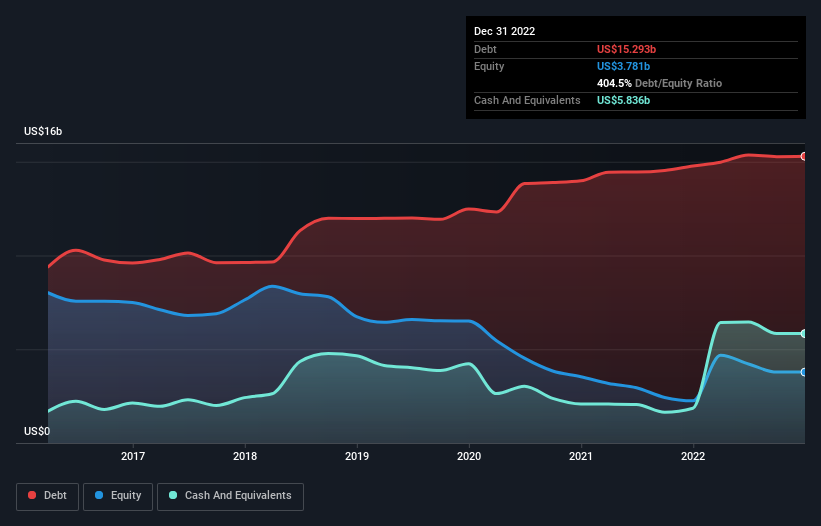
David Iben put it well when he said, 'Volatility is not a risk we care about. What we care about is avoiding the permanent loss of capital.' So it might be obvious that you need to consider debt, when you think about how risky any given stock is, because too much debt can sink a company. Importantly, Las Vegas Sands Corp. (NYSE:LVS) does carry debt. But the more important question is: how much risk is that debt creating?
When Is Debt Dangerous?
Debt is a tool to help businesses grow, but if a business is incapable of paying off its lenders, then it exists at their mercy. In the worst case scenario, a company can go bankrupt if it cannot pay its creditors. However, a more common (but still painful) scenario is that it has to raise new equity capital at a low price, thus permanently diluting shareholders. Of course, the upside of debt is that it often represents cheap capital, especially when it replaces dilution in a company with the ability to reinvest at high rates of return. The first step when considering a company's debt levels is to consider its cash and debt together.
View our latest analysis for Las Vegas Sands
What Is Las Vegas Sands's Net Debt?
The chart below, which you can click on for greater detail, shows that Las Vegas Sands had US$15.3b in debt in September 2022; about the same as the year before. However, it does have US$5.84b in cash offsetting this, leading to net debt of about US$9.46b.

A Look At Las Vegas Sands' Liabilities
According to the last reported balance sheet, Las Vegas Sands had liabilities of US$3.39b due within 12 months, and liabilities of US$14.3b due beyond 12 months. On the other hand, it had cash of US$5.84b and US$210.0m worth of receivables due within a year. So its liabilities outweigh the sum of its cash and (near-term) receivables by US$11.6b.
While this might seem like a lot, it is not so bad since Las Vegas Sands has a huge market capitalization of US$45.0b, and so it could probably strengthen its balance sheet by raising capital if it needed to. But it's clear that we should definitely closely examine whether it can manage its debt without dilution. The balance sheet is clearly the area to focus on when you are analysing debt. But it is future earnings, more than anything, that will determine Las Vegas Sands's ability to maintain a healthy balance sheet going forward. So if you're focused on the future you can check out this free report showing analyst profit forecasts.
In the last year Las Vegas Sands had a loss before interest and tax, and actually shrunk its revenue by 2.9%, to US$4.1b. That's not what we would hope to see.
Caveat Emptor
Importantly, Las Vegas Sands had an earnings before interest and tax (EBIT) loss over the last year. To be specific the EBIT loss came in at US$783m. Considering that alongside the liabilities mentioned above does not give us much confidence that company should be using so much debt. So we think its balance sheet is a little strained, though not beyond repair. However, it doesn't help that it burned through US$1.3b of cash over the last year. So suffice it to say we do consider the stock to be risky. The balance sheet is clearly the area to focus on when you are analysing debt. However, not all investment risk resides within the balance sheet - far from it. For example, we've discovered 1 warning sign for Las Vegas Sands that you should be aware of before investing here.
At the end of the day, it's often better to focus on companies that are free from net debt. You can access our special list of such companies (all with a track record of profit growth). It's free.
If you're looking to trade Las Vegas Sands, open an account with the lowest-cost platform trusted by professionals, Interactive Brokers.
With clients in over 200 countries and territories, and access to 160 markets, IBKR lets you trade stocks, options, futures, forex, bonds and funds from a single integrated account.
Enjoy no hidden fees, no account minimums, and FX conversion rates as low as 0.03%, far better than what most brokers offer.
Sponsored ContentNew: AI Stock Screener & Alerts
Our new AI Stock Screener scans the market every day to uncover opportunities.
• Dividend Powerhouses (3%+ Yield)
• Undervalued Small Caps with Insider Buying
• High growth Tech and AI Companies
Or build your own from over 50 metrics.
Have feedback on this article? Concerned about the content? Get in touch with us directly. Alternatively, email editorial-team (at) simplywallst.com.
This article by Simply Wall St is general in nature. We provide commentary based on historical data and analyst forecasts only using an unbiased methodology and our articles are not intended to be financial advice. It does not constitute a recommendation to buy or sell any stock, and does not take account of your objectives, or your financial situation. We aim to bring you long-term focused analysis driven by fundamental data. Note that our analysis may not factor in the latest price-sensitive company announcements or qualitative material. Simply Wall St has no position in any stocks mentioned.
About NYSE:LVS
Las Vegas Sands
Owns, develops, and operates integrated resorts in Macao and Singapore.
Very undervalued with moderate growth potential.
Similar Companies
Market Insights
Community Narratives



